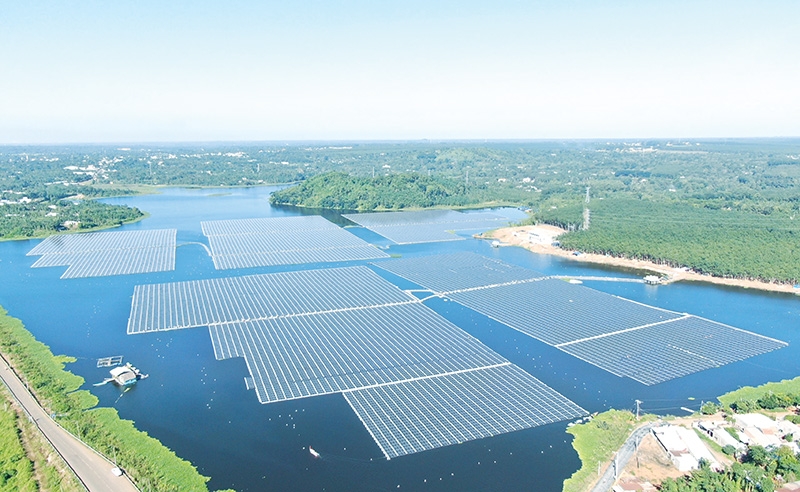ABB supporting region’s biggest floating solar complex
 |
| ABB’s SSU is a complete plug-and-play solution designed to meet demanding requirements of a solar plant |
With the country’s power demand growth forecasted at 10 per cent annually, Vietnam has taken bold steps to accelerate development of renewable energy and started to embrace the benefits of solar power.
The nation’s operational solar power capacity surged quickly and reached approximately 19.4 kilowatt peak by the end of 2020, far exceeding the 5-year goal set for solar power generation in the revised Power Development Plan VII. With that, Vietnam has overtaken Thailand as the largest solar market in Southeast Asia.
Since priority continues to be given to further developing solar power sources to a capacity of 12,000MW by 2030, making up 3.3 per cent of the country’s total energy mix, floating solar power will become an important part of it in the coming years.
Located in Ba Ria-Vung Tau province’s Quang Thanh commune, the Gia Hoet 1 and Tam Bo solar power complex projects include two solar power plants. Both projects occupy water surfaces of 40 and 41 hectares respectively. Invested in and conducted by TOJI Group with a total capacity of 70MWp, it is the largest floating solar power complex in Southeast Asia.
The order of 10 ABB secondary skid units (SSU) was placed to support the start of commercial operations last month, and was deemed a much-needed boost.
ABB’s SSU is a complete plug-and-play solution designed to meet the demanding requirements of a solar plant connecting many 800V string inverters with a single transformer of 6.3 megavolt-amperes in order to reduce the number of transformers as well as installation works. All equipment is tested in order to match the high load required during operation of the solar plant. All are pre-engineered, configured, and tested at ABB’s facility in Vietnam before being shipped to customers for fast installation and commissioning to match the project’s tight schedule.
For both the Gia Hoet 1 and Tam Bo solar power complex, each customized solution includes 22kV switchgear SafePlus with Relion® 605 series protection relays, 6300KVA distribution power transformers, and 800V LVS low-voltage switchgear equipped with Emax 2 air circuit breakers and Tmax T molded case circuit breakers, as well as SCADA system connection.
The SSU has a wide capacity range from 1000-6800KVA to suit project requirements, while its voltage range is suitable for all existing inverters on the market.
With all equipment and type-tested in compliance with international IEC standards and some meeting local technical requirements set by Electricity of Vietnam such as the MV switchgear SafePlus, ABB’s SSU ensures safety for the operator and the public.
Its robust design makes it easy for transportation and helps optimise cooling from and therefore reduces energy consumption. In addition, the customized design for LV switchboards also offers direct connection comprising 44 inputs, enables optimal installation of combiner boxes and saves time and cost.
Ho Minh Tien, CEO of TOJI Group said, “The project had a tight schedule and delivery time was very critical. ABB’s local manufacturing facility shortened the lead time and allowed us to have the equipment at the site within the expected timeline. In addition, with all equipment sets, we were able to minimise installation time, risks on site, and reduce costs, while ensuring international standards in quality and safety.”
The ABB team also supported the speed up of production, with TOJI receiving equipment on-site one week earlier than the initial commitment.
“ABB’s team support significantly shortened the time to put the project into operation and helped us generate income earlier than planned,” Tien added.
Doan Van Hien, sales director of Electrification Business at ABB Vietnam said, “ABB and TOJI have a solid track record in their cooperation for Vietnamese solar power. We are proud to be a partner of TOJI in this project and help our customer accomplish the project quickly and efficiently.”
“We are also looking forward to expanding collaboration with TOJI in future projects, as well as helping developers in their project executions and drive the green growth path of Vietnam,” Hien said.
What the stars mean:
★ Poor ★ ★ Promising ★★★ Good ★★★★ Very good ★★★★★ Exceptional
Themes: Sustainable Energy
- 16th national conference on nuclear science and technology opens in Danang
- Technology and Energy Forum 2023 to open in Quang Ninh
- Asia Clean Capital Vietnam receives backing from Swiss Investment Manager
- Amazon scales renewable energy to fight climate change
- Universal Alloy Corporation Vietnam partners with Asia Clean Capital Vietnam
Related Contents
Latest News
More News
- Trung Nam-Sideros River consortium wins bid for LNG venture (January 30, 2026 | 11:16)
- Vietnam moves towards market-based fuel management with E10 rollout (January 30, 2026 | 11:10)
- Envision Energy, REE Group partner on 128MW wind projects (January 30, 2026 | 10:58)
- Vingroup consults on carbon credits for electric vehicle charging network (January 28, 2026 | 11:04)
- Bac Ai Pumped Storage Hydropower Plant to enter peak construction phase (January 27, 2026 | 08:00)
- ASEAN could scale up sustainable aviation fuel by 2050 (January 24, 2026 | 10:19)
- 64,000 hectares of sea allocated for offshore wind surveys (January 22, 2026 | 20:23)
- EVN secures financing for Quang Trach II LNG power plant (January 17, 2026 | 15:55)
- PC1 teams up with DENZAI on regional wind projects (January 16, 2026 | 21:18)
- Innovation and ESG practices drive green transition in the digital era (January 16, 2026 | 16:51)

 Tag:
Tag:



















 Mobile Version
Mobile Version